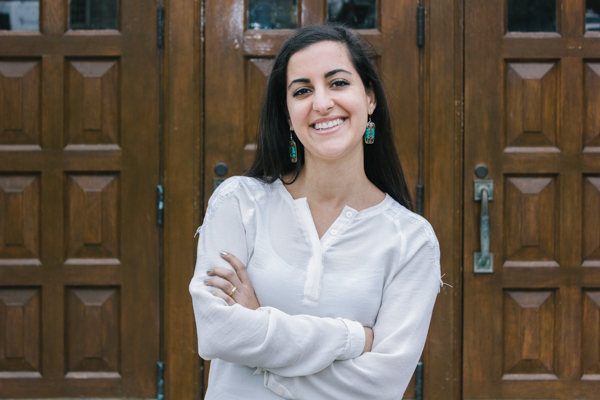Admissions
Equity, Diversity, Inclusion and Decolonization
The School of Graduate and Postdoctoral Studies is committed to equity, diversity, inclusion and decolonization in all aspects of graduate and postdoctoral studies. For more information regarding these commitments please visit grad.uwo.ca/edi-d.
Geography and Environment
Doctor of Philosophy (PhD)Meet Siera Vercillo, PhD candidate in Geography and Environment

Supervisors: Dr. Isaac Luginaah and Dr. Anthony Weis
What’s the best advice you could give to someone considering applying to your graduate program?
Ask questions and reach out to people in the program and department: both faculty, students and administrators. They want to talk to you and provide you with as much information as possible to help you make decisions about your future graduate program.
Where did you complete your undergraduate degree?
University of Toronto in Political Science and African Studies (Bachelors of Honours Arts) Institute of Development Studies, University of Sussex in Gender and Development (Masters of Arts)
Describe your research in 100 words or less.
My research finds solutions to the problem of hunger globally. Paradoxically, those who suffer the most from hunger are small scale, female farmers, who also grow most of the world’s food. They are disproportionally food insecure because they depend on their environments and market prices that are unstable. Men are migrating out of rural areas because farming is becoming more challenging, and women have increasing roles in growing and selling food to feed their families. I explain the political, economic, social and environmental factors that are contributing to this, and its implications, applied to the comparative case study of Ghana.
Where’s your favourite place on campus to work?
I prefer to work in the Environment, Health and Hazards Lab in the Geography department where I have a desk because of the interactions with my Canadian and African colleagues pursuing similar research. We collaborate to contribute to knowledge, solve problems and make policy recommendations.
What are you most passionate about?
Working towards social justice: ensuring women’s rights and the right to food.
What is it about your grad program that enables you to thrive and be successful?
The supportive community – without my colleagues in the lab, active guidance from my supervisors and reliable administrators I would likely have lost my focus.
What is your “dream” career?
To work in research for social justice – that could be as a faculty member at a university, a policy analyst for government or as a programs adviser at a research think tank or non governmental organization.
What one thing would you like people to know about you?
I am a feminist geographer who likes to cook.
Program Websites
Program Contact
Lori Johnson (ljohns24@uwo.ca)Graduate Administrator
Department of Geography and Environment
Western UniversitySocial Science Centre Rm 2322
London, Ontario N6A 5C2
t. 519-661-2111 ext. 85033
f. 519-661-3750
The PhD is a research degree in which the thesis, contributing original knowledge to the field of research, is the primary focus. Graduates go on to academic careers or to other occupations in which doctoral-level education is an asset or prerequisite. Courses are chosen to ensure that students have the background required to undertake the thesis research. Students are educated in geographical research through courses and especially through direct individual supervision.

The Own Your Future doctoral professional development program will help you become a career-ready graduate with the skills necessary to excel in your studies and achieve your future goals. By participating in the program, you will assess your own strengths and opportunities for growth, choose what skills you want to enhance during your time at Western, and learn how to articulate the skills you gained in your degree to optimize your future career opportunities. To learn more, visit www.uwo.ca/ownyourfuture.
Program Length
- 12 Terms
Program Design
- Full-time study
- Thesis-based
Funding Information
Applicants are encouraged to apply for the following scholarships (if eligible):
Tuition and Fees
Tuition and fee schedules (per term) are posted on the Office of the Registrar's website at http://www.registrar.uwo.ca/student_finances/fees_refunds/fee_schedules.html
Graduate Student Affordability Calculator
Use this helpful tool to estimate how much money you will need to pay for your tuition, fees, housing, food, and other necessities for a 12-month (three term) academic year.
Admission Requirements
- Successful completion of a Master’s degree.
- Minimum GPA of 78% or B+ from all graduate grades.
Additional Requirements
- Covering letter (offering additional information or clarification of application items).
- Sample of graduate-level writing.
- Résumé (a brief summary of experience, achievements and skills).
- Copies of relevant publications, if available.
English Language Proficiency
Applicants whose first language is not English must furnish evidence of their proficiency in the use of the English language:
- The Test of English as a Foreign Language (TOEFL). iBT (internet-Based Test): The minimum acceptable score is 86, with no individual score below 20 for the internet based version, or 550 for the paper and pencil version. [Western's TOEFL ID is 0984].
- The International English Language Testing Service Academic (IELTS Academic). The minimum acceptable score is 6.5 out of 9. The IELTS is offered in six test centres in the US and three in Canada.
The Department of Geography and Environment does not require applicants to submit GRE scores, but these can be submitted in support of an application.
Application Deadline
- February 1
While we technically receive applications year round, the Graduate Affairs Committee begins review of applicant files for Fall admission in February. Applications received after the deadline may have a lower chance of success for admission and funding.
Fields of Research
- Environment, Development and Health
- Geographic Information Science
- Physical Geography
- Urban Studies






